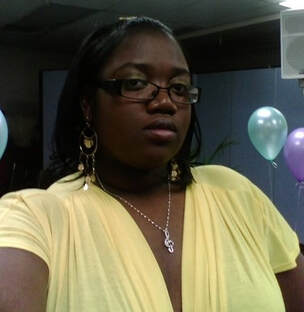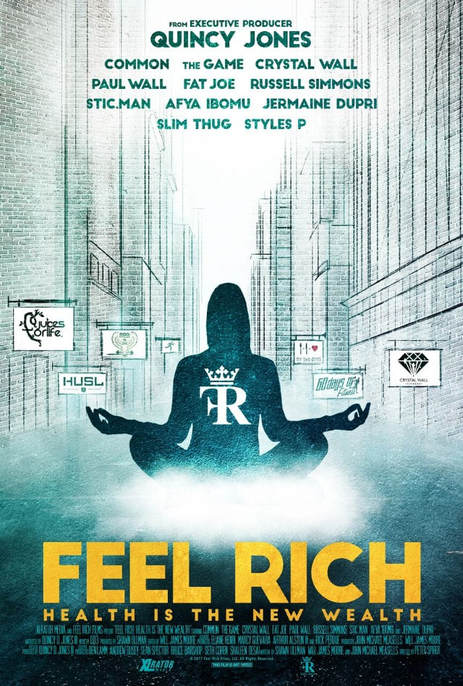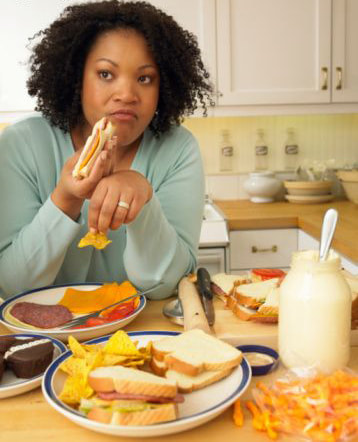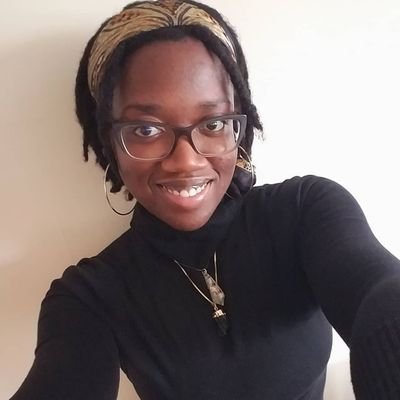 Me at 16 years old. Me at 16 years old. When I was 16 years old, my mom hired me a personal trainer. It was at a gym that I'd never been to before, though I was no stranger to exercise. At the time I was quite overweight, and I'd tried in earnest to do the things that I thought would address the problem, but I honestly had no clue what to do. Though I was a bit apprehensive, I embraced the idea of having someone with the experience and expertise to help me along my journey. It turned out to be one of the most embarrassing experiences of my life. I don't think he liked me much. Why? To this day I'm unsure. I don't want to assume that it was because I was an overweight Black teenaged girl, but I don't think it helped that we had absolutely nothing in common. He was a muscular white guy, probably in his late twenties or early thirties, and considering that we were in a wealthier, majority white neighborhood that I did not live in, he probably hadn't had many clients like me. I was quiet and shy, but I did everything that was asked of me, without complaint. The workout would begin with a strength circuit, silently jumping from machine to machine. He'd adjust the weights and I'd perform the movements. Next he'd bring me over to the dreaded stairs where I'd have to run up and down for what seemed like ages. These were the moments when my lack of fitness really came to the fore. Those stairs would leave me winded and I'd always feel like a pathetic mess after the fact. Once it was all over, he'd plant me on one of the treadmills, tell me to walk for a half hour, then leave. No praise, no discussion of how I'm improving, nothing. The moment of embarrassment, the moment when I decided that I sure as hell would not be renewing my contract once it was over, came during a review of my diet journal. As was requested of me, I kept a detailed journal (as detailed as a 16 year old could anyway) of the meals I ate during the day and presented it to him for review. One day, I proudly handed over my diet journal, pleased with how many salads I'd managed to eat, confident that he'd see my efforts and be thrilled. Wrong. He blew up at me. Within view and earshot of other patrons, my trainer yelled at me and accused me of trying to sabotage myself. I was confused until he asked why the hell I would be eating a beef patty, so high in saturated fat, when I was trying to lose weight. Now, at 16, I had no clue what the hell saturated fat was or why I should be avoiding it. As a matter of fact, I'd never had any nutritional counseling or education whatsoever. It wasn't something that was taught in school, and it wasn't something that my trainer had discussed with me. All I knew was that I should "eat better", and so I ate as well as I knew how. I ate salads when possible, and smaller amounts of everything else. But being of Jamaican descent and living in a Jamaican neighborhood, beef patties were ubiquitous, and it felt like such a normal and harmless thing to eat. I figured, hell, it's high in protein, right? Never in my wildest dreams did I think that having one beef patty would be such a problem. I was humiliated. I felt smaller than I had already been feeling throughout the process, the smallest I'd felt since the entire thing started. I struggled, but I managed to hold back tears until our training session was over. For a few more weeks, I would continue to go to my training sessions, and the tension between us never dissipated. Once the training package had run its course, I told my mother to save her money because I would not be going back. I would continue to struggle with my weight and my diet for many years after this, putting on much more weight than when I began. I was no better off for having had a trainer, and in some ways, in the emotional and mental ways, the ways that I now know matter the most, I was worse off. My confidence was shot, and I felt like a hopeless cause. I've heard many similar stories since then. Stories of people shelling out their hard earned cash to pay for training packages with trainers who were rude, dismissive, judgmental, and racially or culturally insensitive. Trainers who resorted to verbal and emotional abuse instead of providing support. Trainers who put their clients through the motions of working out without explaining why they were doing the things that they were doing, only that they must do it if they want to reach their goals. This kind of training was popularized on television shows such as The Biggest Loser where overweight and obese contestants were regularly yelled at, belittled, and broken down under the guise of building them back up stronger. Their bodies were put on display in disturbing weigh-ins where normal, healthy weight loss was treated as failure while losing huge, unrealistic amounts of weight was celebrated as a success. We now know that the long-term result of all of this was metabolic damage, not to mention any emotional and psychological pain that was endured. Shows like The Biggest Loser perpetuate the notion that people who are overweight and obese deserve to be abused and humiliated. That they must pay penance for daring to exist in their fat bodies. While there are plenty of reasons why everyone should eat healthier and get regular exercise, abuse, belittlement and judgment are not the ways to go about it. After years and years of jumping from gym to gym and tinkering with my diet, I was finally able to lose a substantial amount of weight on my own. But I resented the fact that I had to go it alone. I had to do extensive amounts of research in order to successfully navigate the clusterfuck of nutrition and fitness misinformation that's out there. Now, with fitness training and nutrition coaching certifications under my belt, I see much more clearly just how fucked up my experience has been. It shouldn't be this hard. It shouldn't be this difficult to take control of your own body. It shouldn't be this hard to be healthy. But this is the environment that we live in. Decades of processed food products being normalized as daily fare. A fast food restaurant on just about every corner. Convenience foods sold as viable substitutes for home-cooked meals because if you want to pay your rent you have to spend obscene amounts of time working, and who has time and energy to cook after working 40+ hours a week? Public health messaging that tells you that if you just move more, you'll lose more, and everything will be fine. Diet companies that profit off of nutritional ignorance by promising you that their particular brand of trash or their proprietary method of starvation is exactly what you need to eat to lose weight. A government that's been co-opted by industry lobbyists who purposely obscure any attempt to tell you the truth - that eating their addictive products is making you fatter and unhealthier, and no amount of exercise in the world can offset a poor diet. As a nation, we don't know how to properly eat and it's by design. We keep pretending like we don't know how obesity rates continue to rise, but the answer is right there, plain as day: as the majority of working people toil day in and day out to afford a living, they're forced to prioritize financial survival over self-care, health and wellness, and billion-dollar industries - from food to fitness to pharmaceuticals - profit off of that fact. People are kept confused on purpose, and when they slip up and find themselves in a poor state of health, the entirety of the blame is placed squarely on their shoulders. It's their fault for being misled, for being misinformed, for being unaware. This is a cop-out that will continue to exacerbate the spiraling health conditions that we're experiencing as a nation. There are too many people suffering to continue to categorize this as simply a matter of individual willpower. Because the needs of industry are placed above the needs of the people, people are forced to be extra discerning about who to trust when it comes to nutrition and fitness advice. It is unfortunate that there seem to be more entities concerned about making a dollar than making a difference. One scroll through Instagram will show you countless examples of "professionals" who approach fitness from a place of vanity and showmanship, who are themselves equally as misinformed about health and nutrition as the people they're trying to take on as clients. People deserve better. They deserve to be seen as individuals, to be understood for who they are in the context of the lives they've lived and the experiences they've had, not as stereotypes. They deserve to have their needs and concerns addressed in a manner that is understanding and empathetic, not judgmental and dismissive. They deserve proper guidance on how to live a cohesive lifestyle where movement is accessible, enjoyable, desirable and safe, rather than painful and punishing. They deserve to be able to enjoy food confidently, knowing they've been armed with the knowledge necessary to make healthy decisions for themselves and their families. Unfortunately, I don't envision that the billion-dollar industries that profit from poor health will all of a sudden gain a conscience. Nor do I see our elected officials deciding to put their financial positions at stake by facing these industries head on. Change has to begin at the bottom. Until enough fitness and wellness professionals take it upon themselves to ensure that they're providing their clients with proper knowledge and treating them with the respect that they deserve, people will continue to fall prey to the well-established, insidious traps of diet and fitness fads.
6 Comments
Photo Source: Feel Rich Can we talk about pain for a minute? Recently I wrote about my struggle with emotional eating. I understood that I was eating my pain long before I kicked the habit for good. Of course, it started insidiously. For most of my teenage years much of my emotional eating was done on autopilot. I lived for the rush that came from the food I was eating, but I wasn't quite aware that that was the case. I would eat enough that the pain would become imperceptible, and I would remain distracted right up until it was time to eat again. This worked for many years, but the pain continued to mount. The stress continued to grow, my worries became bigger, and eventually, food simply wasn't enough to hide the fact that I was hurting.
I suspect that this is how it goes for a lot of people. By the time we even become aware that we have a problem, it's already become habit. We do it every day, multiple times per day, and because the harm isn't immediate it's easy for us to wake up in the morning and do it all over again. But at some point, the signs start to appear. The consequences start to creep up, slowly but surely. We know that we have to change, but we're in so deep that it seems like such an impossible feat, and even when we decide we're ready, we struggle to fight the temptations. The behavior has become so ingrained in our everyday life that it's hard to get control of it. We've become addicted. So why am I bringing this up? Recently I watched a new documentary on Netflix called 'Feel Rich', which features several Hip-Hop stars discussing the importance of wellness in "the Black community" (I hate to refer to us as a monolith but bear with me), and the urgent need for us to take the health of our minds, bodies, and souls seriously. At first blush the concept almost seems condescending, rich rappers telling regular folk that true wealth lies in health, and I admit I was skeptical initially. However the film stirred up some emotions that ultimately changed my mind. The film has an important message, and it needs to be heard. What I saw in the film is a level of vulnerability rarely seen in Hip-Hop. In an industry that thrives on maintaining a facade of invincible masculinity, it was refreshing to see men being real about their own struggles with food, drugs and health. But, considering that many of their peers are prematurely dying at an alarming rate, it was very much so coming from a sober place of urgency. On top of the varying degrees of violence that Black people face daily, the overwhelming lot of us are being victimized by the food we put on our plate. You might say, "well, we choose what we eat". Well my response is, yes you do, but no you don't. Fact of the matter is that systemic racism, in the form of supermarket redlining, food deserts, and fast food that targets us as kids combined with the levels of stress that comes with trying to navigate various systems of oppression on a daily basis places Black people in a unique position. Not only do we tend to have less access to healthy food, but we're also facing high levels of stress while being presented with very few healthy coping mechanisms. Our environments (and often, our paychecks) dictate that the chicken joint, the Chinese food spot & the liquor store are our most viable options, and when it comes to short-term comfort, they do provide relief. But the long term effects are absolutely devastating, and we're seeing them occur in real time. For Black Millennials, we only have to look to the elders in our families for signs of what may come. We all have some instance of high blood pressure, diabetes, cancer, obesity or heart disease within our families. But what makes the issue of health even more crucial for us is that while many of our elders only started consuming fast and junk "food" in high amounts as young adults or older, many of us have been consuming these things since early childhood. Millennials in general are experiencing diseases like colon cancer much earlier than usual. Children are presenting with diseases like type 2 diabetes which used to only be seen in adulthood. Many of us think that we have time to spare before we truly have to begin taking our health seriously, but the truth is that most of us should be trying to reverse the damage that has already been done. To me, the film's most powerful message is that a certain amount of power over our health has been wrested from us, and we desperately need to take it back. Make no mistake, too many of us, like most Americans in general, are addicted. If it ain't the cheese that you simply can't give up, it's bacon or donuts or pizza or liquor or pharmaceuticals. We just can't seem to live without these things because they were there to catch us when we were at our most vulnerable, and for many of us, this started in childhood. Yes, we pick our poisons, but in so many ways, our poisons choose us. Recognize that when our neighborhoods are forcibly saturated with fast "food" restaurants and supermarkets with shitty produce (if there are any markets at all), then what we put in our mouth is still being controlled and decided for us. The only difference is that now it's purposely addictive and killing us slowly, and we're shelling out our cash to pay for it. The consequences are seen not only in the high rates of illness, but also in everyday life, from the inability to focus, to the inability to move unhindered, to the inability to regulate our emotions. There is no part of our daily life that is not affected by our nutrition. Urban gardener Eugene Cook said it best in the film, "Stabilizing the food system allows for the great thinkers, the great musicians, the great healers, the great teachers to come because they're being born into a society that nourishes them. We grew food as a communion with nature, with an understanding that everyone should eat... but everyone should eat the best possible food so we can get the best possible results from every member of the society". We can't expect collective progress if the community potential is stunted by poor health. None of this is meant to absolve the many systems that are guilty of perpetuating racial inequality, however. In whatever ways we can, we must always seek to hold these systems accountable, whether they're our local police precincts, community planners, health administrators, or otherwise. But I think that it is a huge mistake to place all our bets on these systems changing. We simply don't have the time. Whatever we can do to place pressure on these systems must be done, but we need nourished, healthy, clear-thinking citizens to do the work. Self-empowerment isn't the sole answer to racial and class liberation, but it's an essential tool in the arsenal against oppression. As Black Millennials, we need to be healthy enough to be at the forefront of the struggle for true transformation and progress within and outside of our communities. But first we have to be willing to be vulnerable. We have to be willing to look at ourselves honestly, and confront our addictions. To do so, we must be willing to confront our pain. For me, that meant finding a therapist, but I know that that is a privilege that not many of us have. The film does a great job at offering viable solutions that most people can try. Taking up meditation is something that anyone with a few minutes to spare can do. Volunteering at a community garden is a great way to not only reconnect with nature and real, fresh foods, but it's a way to create important communal bonds while helping to offset the oversaturation of junk food in our communities. Choosing to eat as well as your circumstances allow (of course, I advocate a plant-based diet) is a major step that can quite literally change your life. Ultimately, we have to believe that we're worth the effort that it takes to take care of ourselves. We're worth the effort that it takes to actively and consistently choose to meditate, or workout, or eat a healthy meal. Not only are we worth it, but we deserve it. We've spent so much of our lives facing all kinds of stress, and trauma and pain, and this often cruel world gave us junk food and other addictive substances to cope. Wellness isn't just for rich, white folk. We've been made to believe that wellness is only for people who can afford it, but that's bullshit. Wellness is in our roots, we just need to dig deep enough to find it. I remember my very first McDonald's cheeseburger. Vividly. I was around seven or eight years old, in the back of my babysitter's car. I have no clue where we were off to but I do remember driving through the drive through and picking up a happy meal. Up until this point, I didn't care much for food. To say I was a picky eater is an understatement. My mother constantly struggled to get me to eat. I was the kid who was always forced to sit at the table until I ate my dinner, and whether by tears or by making my meal inedible by dousing it in too much ketchup, I'd eventually find a way to free myself without ever really touching my food. So when I bit into that cheesy, salty, fatty flavor bomb of a cheeseburger, I felt something that I had never felt before while eating: pleasure.
I would spend the next decade and a half constantly seeking that same feeling, and I would always find it. Bacon, egg and cheese sandwiches, gigantic, greasy slices of pizza, french fries covered in mysterious cheese-like substances, sweet & spicy general tso's chicken - I spent my adolescent and young adult years indulging and overindulging in all the junk food that New York City had to offer. By my sophomore year of college, I'd eaten myself up to 242 pounds, and despite all the pleasure I was deriving from food, I was more depressed and anxious than ever. It would take a couple more years for me to realize that I had quite a destructive relationship with food. I constantly sought pleasure from food because it was the only way I knew to soothe myself. Since that fateful day during my childhood, food had been the answer to the worst of my emotions. Rather than dealing with them directly, I would stuff them further and further down until I no longer had to contend with them. I would binge on food until I was stuffed and uncomfortable, and though it was a fleeting moment of pleasure that would subside all too soon, I was glad to feel even the slightest bit better. I was a junkie, and food was my drug. A week after graduating from college, I ended up in the hospital with what would turn out to be a panic attack. I had spent years pushing my feelings to the side and covering them up with food so that I could cope long enough to get shit done. But I eventually learned that it's impossible to avoid these feelings forever. I realized that I needed to focus on my health and well-being, and I eventually embarked on a journey of health and wellness. Within a few years, I'd lost 60 pounds, I was powerlifting to deal with my mental health, I was fitter than ever, and I'd even become a certified personal trainer. Everything was going great, until a series of triggers plunged me into a deep depression. Of course, my instinctual response was to seek comfort in food, and the more indulgent the better. My weight was steadily creeping back up, old ailments were starting to rear their nasty head, and new ones were beginning to appear. I was terribly unhappy, caught in a web of despair that seemed to have no end. My unhealthy relationship with food was a symptom of problems that were much bigger than I wanted to admit. At the urging of my husband, I sought therapy. I don't know if I would have adopted a vegan diet were it not for therapy. Months of working through my problems allowed me to settle into a more rational head space. Rather than running from my problems, I was tackling them head on. One of these problems was my health. I didn't feel healthy and I had to take a deep, honest look at myself. Despite all my book knowledge, despite all my knowledge of health, nutrition, and fitness, I wasn't taking care of myself. Because honestly, I just didn't give a fuck. In an attempt to clean up my diet and improve my health, I did tons of research that eventually led me to a vegan diet. I'd tried it briefly many years before, but I did not have the nutritional or culinary knowledge that I do now, so I fell off that wagon all too quickly. This time, however, there was much conviction behind my decision to adopt a plant-based diet. I was tired of feeling like shit, and I was tired of treating myself like shit. I did not expect, however, that going vegan would drastically change my relationship with food. I no longer seek pleasure from food because honestly, I don't feel the desire to. Nourishing myself with nutrient-rich foods has done wonders for my mental health. I now know what it's like to experience sadness and anger without being entirely consumed by it. I couldn't believe that it was possible until I read the same testimony from others. My depression, which has been with me since childhood, has totally disappeared. Further research into the relationship between mental health and nutrition has confirmed for me that yes, plant-based diets can greatly improve depression. I now realize that food is not only fuel, it is medicine. Now that I no longer eat my feelings, I am able to look at my food in a more objective and rational way. Most of the time, I am eating to nourish myself. I'm now in tune with what my body needs to thrive, not what my mind needs to feel better for a brief moment in time. I eat to fuel my newfound love of running, I eat for boundless amounts of energy, I eat to look good, feel good, and most importantly, I eat to thrive. With all this as a foundation, the occasional plant-based indulgence becomes all the more decadent, and best of all, I no longer feel guilty about what I'm putting into my mouth. Even greater than all of this is that I've also been able to take a good honest look at myself and realize that the food I eat has an effect on so much more than just me. From the sentient beings whose lives are lost, to factory workers toiling in unsafe conditions, to poor communities that are being sickened by living near unhygienic factory farms, there are countless lives that are affected by the food I put into my mouth. The notion that I can contribute to suffering by helping to create a market for "food" that I don't actually need no longer sits well with me. Not to mention the environmental impacts of carbon & methane emissions, deforestation and overfishing. I am not at all deprived, I eat lots of delicious food, and I'm a bigger foodie than ever. I now take pleasure in knowing that my actions match up with my values and convictions. I no longer eat out of emptiness, but from a place of love. Love for myself, love for animals, love for my people, and love for my environment. Veganism has helped instill in me a sense of responsibility for the Earth that I live on and all the beings that I share it with. And that is the most pleasurable thing of all. |
AuthorMy name is Nivea, but you can call me Niv. I'm an independent Plant-Based Nutrition & Fitness Coach hailing from the Bronx, NY. Archives
August 2021
Categories
All
|




 RSS Feed
RSS Feed